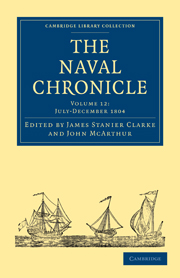 The Naval Chronicle
The Naval Chronicle Book contents
- Frontmatter
- PREFACE TO THE TWELFTH VOLUME
- PLATES IN VOLUME XII. From Original Designs
- BIOGRAPHICAL MEMOIR OF SIR ISAAC COFFIN, BART. REAR-ADMIRAL OF THE WHITE SQUADRON
- BIOGRAPHICAL MEMOIR OF THE HON. GEORGE CRANFIELD BERKELEY, REAR-ADMIRAL OF THE RED SQUADRON
- BIOGRAPHICAL MEMOIR OF SIR PETER PARKER, BART. ADMIRAL OF THE FLEET
- BIOGRAPHICAL MEMOIR OF THE LATE SIR PETER WARREN, K.B. VICE-ADMIRAL OF THE RED SQUADRON
- BIOGRAPHICAL MEMOIR OF SIR NATHANIEL DANCE, KNT. Commander of the Honourable East India Company's Ship Earl Camden, and Commodore of their Fleet homeward-bound from China
- BIOGRAPHICAL MEMOIR OF SIR RICHARD KING, BART. ADMIRAL OF THE WHITE SQUADRON
- INDEX
BIOGRAPHICAL MEMOIR OF SIR PETER PARKER, BART. ADMIRAL OF THE FLEET
Published online by Cambridge University Press: 10 January 2011
- Frontmatter
- PREFACE TO THE TWELFTH VOLUME
- PLATES IN VOLUME XII. From Original Designs
- BIOGRAPHICAL MEMOIR OF SIR ISAAC COFFIN, BART. REAR-ADMIRAL OF THE WHITE SQUADRON
- BIOGRAPHICAL MEMOIR OF THE HON. GEORGE CRANFIELD BERKELEY, REAR-ADMIRAL OF THE RED SQUADRON
- BIOGRAPHICAL MEMOIR OF SIR PETER PARKER, BART. ADMIRAL OF THE FLEET
- BIOGRAPHICAL MEMOIR OF THE LATE SIR PETER WARREN, K.B. VICE-ADMIRAL OF THE RED SQUADRON
- BIOGRAPHICAL MEMOIR OF SIR NATHANIEL DANCE, KNT. Commander of the Honourable East India Company's Ship Earl Camden, and Commodore of their Fleet homeward-bound from China
- BIOGRAPHICAL MEMOIR OF SIR RICHARD KING, BART. ADMIRAL OF THE WHITE SQUADRON
- INDEX
Summary
“I persuade myself that at a time when our Fleets render the Nation so formidable abroad, it cannot be unseasonable to let the curious see by what steps Great Britain arrived at such an height of naval power and reputation.”
Preface to Colliber's Columna Rostrata.The veteran head of our Navy is an object not to be contemplated but with veneration. From his personal Valour, his professional skill, and his general merit, Sir Peter Parker is entitled to the respect and esteem of every son of Neptune, of every inhabitant of the British dominions.
Sir Peter Parker, Bart, now Admiral of the fleet, is the son of the late Rear-Admiral Christopher Parker, descended from a very respectable and ancient family in Ireland. Of the period of his birth, or of his entering the service, we are not in possession; but we find his first appointment, as Lieutenant, to have taken place in the year 1743. Admiral Matthews, who was at that time Commander in Chief on the Mediterranean Station, advanced him to this rank on board of the Russel, Captain C. Long. During the year of Mr. Parker's appointment, the Mediterranean Fleet continued in Hieres Bay, the chief service which it performed being that of blocking up the French and Spanish Fleets in the harbour of Toulon.
- Type
- Chapter
- Information
- The Naval ChronicleContaining a General and Biographical History of the Royal Navy of the United Kingdom with a Variety of Original Papers on Nautical Subjects, pp. 169 - 256Publisher: Cambridge University PressPrint publication year: 2010First published in: 1805


